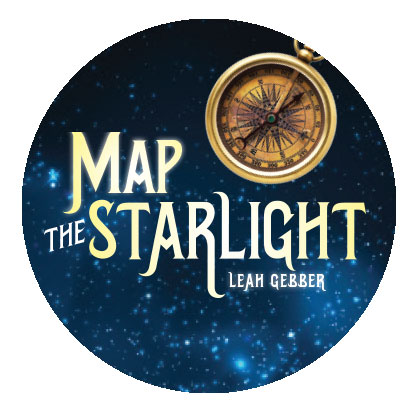Map the Starlight: Chapter 41

The glass is thick; cheaply made. But there is something inside it, she is sure. She holds it tight, and wades back to the shore

All that night, Aster chases sleep. She lies on one side, the other, curls into a ball, hoping for some reprieve from the words and images that shiver through her. But when she finally falls into slumber, she is pursued by faces — Brother Garcon and Mose ben Isaac; Neemias and Clara, a tangle of features and staring eyes. Again and again, she jerks awake, shaking.
When the room lightens, Clara rises. Aster closes her eyes, that her sister may leave the room without greeting, without any words having to pass between them.
The sun climbs. It is only the thought of Papa that pulls Aster out of bed.
She dresses quickly, splashes water over her face, hopes to somehow banish the webs of night. Then she knocks lightly on Papa’s door and coaxes him out of bed — he looks withered, bent into old age — and helps him wash his hands. When Papa is dressed, she leads him to his study so he can pray.
But when he has finished his prayers, he sits down in his chair, folds his hands in his lap, and stares, wordless, ahead of him.
“Papa?”
No response.
“Papa, I will bring you food and drink.”
She sets before him a tray of summer fruits, cuts open a ripe peach. Papa glances at the rich, orange sweetness, and shakes his head.
She sighs, almost irritated. All she wants is a few minutes of solitude, to think. But she must step out of her own concerns, and pull Papa out of his misery. What? What will do it?
The answer is so obvious that Aster gives a bitter laugh. In Papa’s study, she takes out her own map of the Holy Land, the one she has been working on for the French friar. She spreads it open on the table in the living room, across from where Papa sits.
“Papa?”
He does not even acknowledge her presence.
“Papa, see, I am almost finished. There’s just the Mediterranean to fill in, and the place names, in Latin.”
Nothing. No response, no movement. It is like he is carved out of wood.
She forces her voice into a singsong. “So what do you think of my very first map?”
She reaches over and puts her hand on his. His fingers curl, just slightly, around them. But he does not speak.
Aster sinks down into a crouch, and leans toward him, gently leaning her head against his arm.
And still, he does not say a word.
By noon, Regina’s humming scrapes against Aster’s ears, and every time she sets eyes upon Clara, she feels as if all the anger and confusion will flow out, like one of the mountains with a belly of fire that Papa draws in his maps of Italy. She must leave the house, be alone. She bids Papa farewell, and slips through the front door.
Aster walks. Through the Call and out the South Gates into the city.
She has walked the city without chaperone or escort many times, but now she feels a sudden danger. She should not be alone, but how can she not be alone?
(Excerpted from Family First, Issue 584)
Oops! We could not locate your form.


